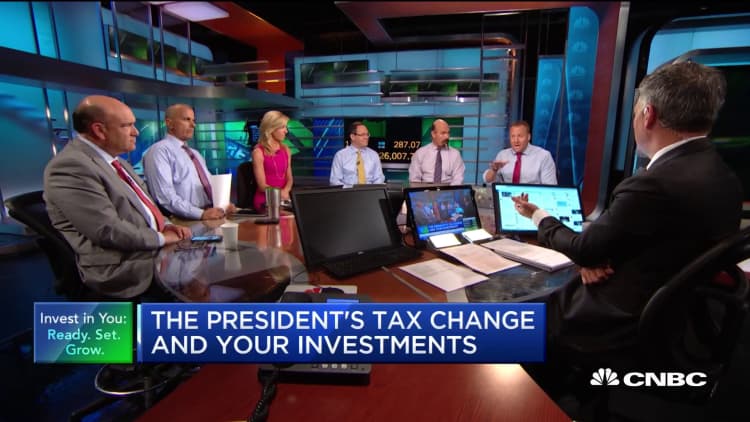U.S. tax revenue as a proportion of GDP dropped the most out of any country in the Organisation for Economic Co-operation and Development in 2018, according to a report released Thursday.
That's largely due to the $1.5 trillion GOP tax cut President Donald Trump signed into law in 2017.
The tax cuts dramatically altered the U.S. tax landscape for the first time in decades by permanently slashing the corporate tax rate from 35% to 21%, temporarily cutting individual tax rates and limiting state and local tax deductions, among other changes.

From 2017 to 2018, the U.S. tax-to-GDP ratio fell from 26.8% to 24.3%, the OECD found, while corporate tax revenues fell by .7% and personal income tax revenues dropped by .5%.
The OECD's overall tax-to-GDP ratio, meanwhile, remained relatively unchanged between 2017 and 2018, from 34.2% to 34.3%.
Thirty-six countries, including many key U.S. allies and economic partners, make up the Paris-based OECD, which serves as a forum for market-oriented democratic countries to discuss global economic issues and policies.
Ireland, Chile and Mexico ranked below the U.S. for 2018, though preliminary data for Australia and Japan have yet to be released.
Only Hungary and Israel came close to the U.S.' 2.5% tax-to-GDP ratio drop, at 1.6% and 1.4%, respectively.
While the tax cuts unsurprisingly shrank federal tax revenue, Trump's promises that the cut would stimulate business investment and economic growth have not yet materialized.
Only a fraction of the 2.9% economic growth in 2018 came from the tax cuts, according to the nonpartisan Congressional Research Service. Instead of investing profits into their own capital investment, companies bought back a record $806 billion in shares in 2018, sending stock prices further upward.
In mid-November, Trump's top economic advisor Larry Kudlow hinted that a middle-class tax cut is on the horizon, though it is unlikely that a Democratic-led House would pass new tax legislation ahead of the 2020 presidential election.
Democratic presidential candidates have roundly criticized Trump's tax cuts for going mostly to top earners, vowing to further overhaul the tax code and implement a range of measures, from wealth taxes to curbs on stock buybacks.
Former Vice President Joe Biden most recently announced his tax plan this week, calling for higher taxes on corporations to pay for $3.2 trillion in education, infrastructure and health-care investments.

